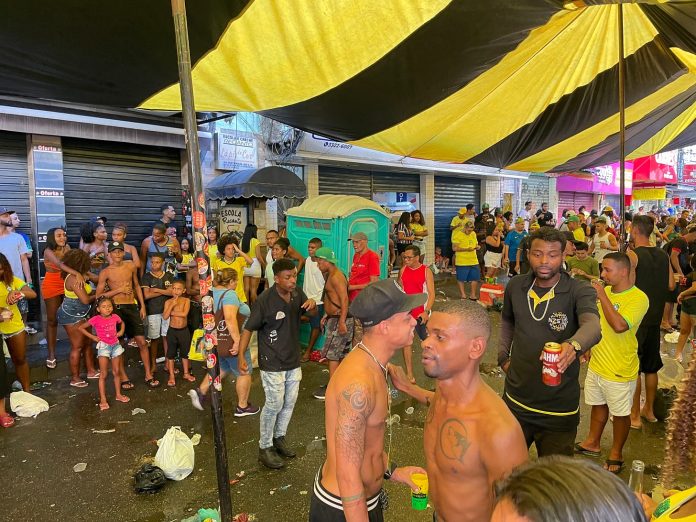A shirtless 16-year old in black basketball shorts pulls up on us with a semi-automatic machine gun swinging around his sinewy frame.
I meet his glistening, dilated black pupils and put my best foot forward with a firm but pleasant “Tudo bem?” – the de facto greeting in this part of the world.
He smiles emphatically, tilts his head back and projects his voice up towards the granitoid cliffs towering above the rambling favela he calls home.
“Gringoooos!!!” he belts out, the machine gun swinging around his exposed rib cage in an uncomfortably unpredictable manner.

I fight off the urge to ask him for a photo –
Our guide Alex has expressly asked us not to take any photos in this particular area, explaining that we were passing through a ‘drug point’.
The people sitting at the ‘drug point’ in white plastic chairs could not have made it any more clear that they are not to be fucked with.
Everyone of them has face tattoos of various gang identifiers – I don’t have any background knowledge to substantiate what precisely makes them gang-related, but the messaging is clear.
Spiritual gurus talk about auras; the same principle can be applied to gangsters.
A customer hops around the ‘drug point’ maniacally while embodying an instant replay from the soccer match that Brazil has just lost to Croatia to eliminate them from World Cup contention. His eyes are dilated to the point of no return, black holes void of anything but the certainty of more cocaine.
We pass through the drug point like the non-player characters we are in this favela – gringos with a hood pass, a single-file boon to the local economy who are kept under tight watch and who do exactly as we’re told.
Rocinha is the largest favela in Brazil. 200,000 working class people call this neighborhood home, including the hundreds of dealers and foot soldiers that control the robust local drug trade here.

The word ‘favela’ itself comes from the favela tree that was transplanted to Rio from Bahia in the North of Brazil – The first favelas took shape in the late 1800’s following the end of slavery. Subsequent waves of urbanization over the next century led to a mass exodus of rural areas in the 1950’s through the 1970’s, with migrants from Brazil’s countryside hoping to take advantage of the economic opportunities available in the growing metropolises of their country.
There are few outsiders who come to Rocinha, and even fewer that get to experience anything beyond the main street that runs through the center of the neighborhood.
There are three bus lines, multiple schools schools, day care centers, a sports complex, and even a bank within Rocinha –
And everyone here has an address, but good luck finding it if you’re not from around here.
Built on top of itself in all directions up the steep slope of Morro Dois Irmãos (Two Brothers Mountain), the concrete domiciles of Rocinha would be million dollar real estate units if they weren’t sitting in what most people in Brazil consider to be an active war zone.

The heavenly views over Leblon and Ipanema neighborhoods and their postcard perfect beaches below are enough to tempt even the most classist real estate developers to give serious consideration to investing in the area – if the local population will allow them in, that is. International buyers from as far afield as Europe and China have bought up chunks of favela real estate in nearby Vidigal over the last decade, sparking a bidding war in place of the more traditional narcotics trafficking war that has historically dominated the favela.
Our guide Alex is a childhood friend of the local drug lord who presides over Rocinha with an iron fist and an immutable code of ethics and laws.

But most people don’t know Jonny as ‘Jonny’ – they know him as “Bravo”
– strangely enough, in reference to Johnny Bravo – the cartoon character.
Bravo and his crew of some 200 dealers are the only show in town when it comes to matters of community policing and control. The military and police units of the Brazilian state typically don’t interfere with community matters in Rocinha or other favelas of Brazil. There are occasional raids on the drug gangs, but there is usually a a political motivation tied to the high profile events. One such instance happened in 2017, when the drug lord known as ‘157’ was deposed from power at the hands of a military operation that included tanks and helicopters infiltrating Rocinha and meeting the considerable firepower of the local gang with missiles and mortars.
The gang in Rocinha is no easy target, despite the artillery of the state; their arsenal apparently includes all caliber of weaponry up to grenades and missiles in addition to machine guns and smaller caliber arms.
But the drug lords of Rocinha are business people first and foremost; firefights with authorities and rival gangs are not their M.O., but rather an unfortunate and occasional necessity of their trade.

Many of the social services in Rocinha are funded out of profits made by the gang; childcare services, private schools, healthcare, and community centers are largely funded by profits made from the drug trade according to our guide. Every weekend, a large party pops for the residents here off from Friday afternoon through Sunday – the expenses for which are covered by the gang.
If an outside business wants to move into Rocinha to trade, they are levied with a tax that is not imposed upon local residents and entrepreneurs.
Likewise, law and order is administered by the gang. If two people get into a fight in public, they are taken before the court of Bravo and his crew. Domestic abuse is not tolerated, and anyone guilty of such is sure to catch a vicious beating that will render them unlikely to be a repeat offender.
In extreme cases like rape, the offender may even be executed for their transgressions.
The drug lords operate from a high ground position at the top of the favela in an area known as ‘Syria’ due to the ongoing conflict and violence that surrounds the area.
The dealers here sell weed, coke, and ecstasy – gangs in other favelas in Rio may sell crack and heroin, but these substances aren’t sold in Rocinha out of concern for the welfare of the population here.

The 200,000 Brazilians who live in Rocinha are the working class of the wealthy neighborhoods below – they commute into Leblon, Ipanema, Copacabana, and other more economically solvent neighborhoods daily to serve the middle and upper classes of Rio.
Many young men from the favela work as deliverymen and taxi drivers. Many of the men above 40 work as ‘doormen’ at the any of the thousands of apartment complexes, hotels, and malls spread out across Rio.
For women under 40 in Rocinha, working in a restaurant or at a shop in one of the malls is the most common occupation – for the women over 40, many work as maids.
One of the highlights of our afternoon visit to Rocinha is the visit to a local family home. Our hosts maintain a thriving woodworking and sewing trade, their house an artists paradise with a commanding view of the Atlantic Ocean below.
The resilience and resourcefulness on display in their workshop defies every stereotype of the ‘violent drug war zone’ that has plagued public perception of Rocinha for much of it’s existence. Rather than a dirty hovel littered with needles and bullet cases, we found flags from 20 countries hanging above a workshop spilling over with creative genius. Instead of an addicts hostile stare, we were met with unwavering generosity of spirit and hospitality. The residents of this house are citizens of the world, true artists with contagious laughter and a panache for hosting culled from the accepted invitation of nationals from dozens of countries around the world who have seen past the misinformed perceptions of Rocinha into the heart of the matter.
While standing on the terrace and listening to Alex tell us about his experience growing up in Rocinha, we hear a volley of fireworks, horns, and cries from the favela below us.
Brazil has lost to Croatia in overtime, and is eliminated from the 2022 World Cup in Qatar.
Though the game is flickering on a screen in the corner of the workshop, neither our hosts not us have been paying any attention to it.
We’ve been busy playing a tabletop version of disc soccer that the host carved himself from wood scraps found lying around the favela.
This is so much more important than the game for everyone here.





